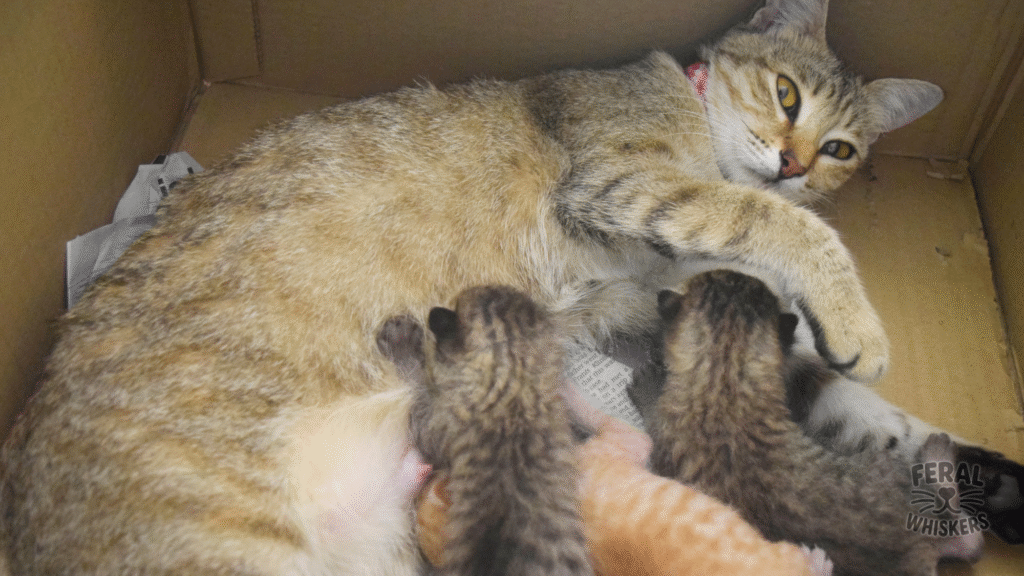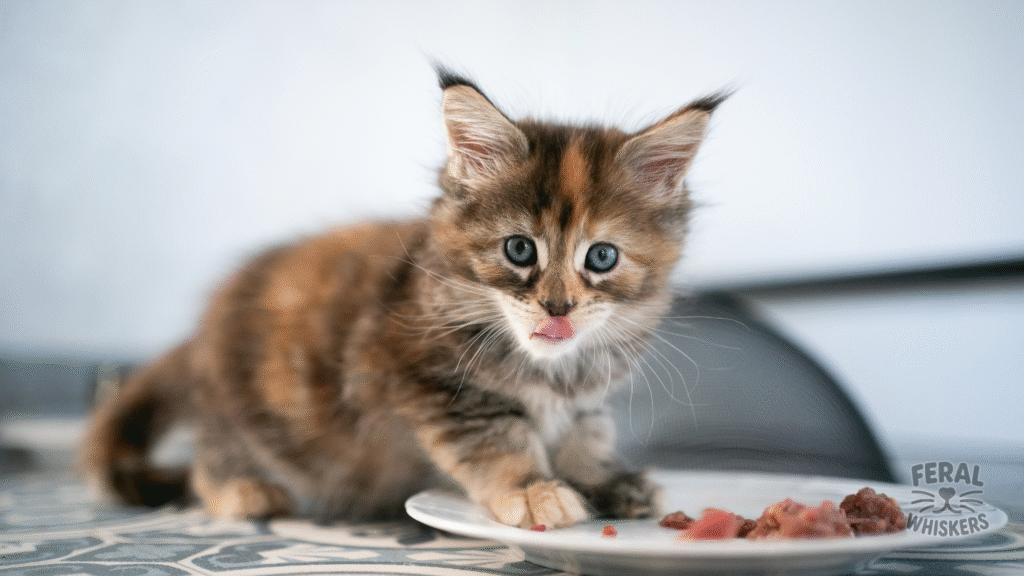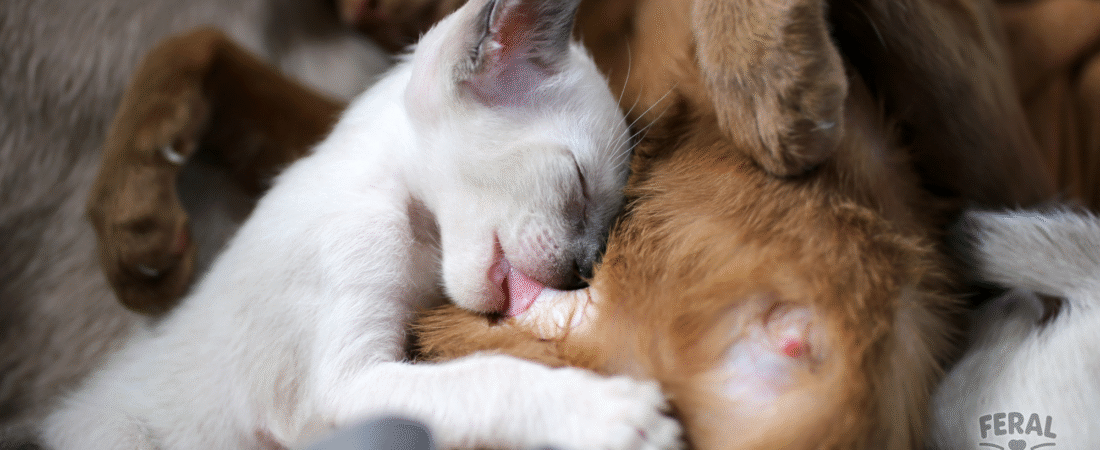📌 Why Kitten Nutrition is Different
Kittens aren’t just “small cats” — their bodies grow at lightning speed. In their first year, they need double the energy of adult cats, higher protein, more fat, and the right balance of calcium and phosphorus for strong bones.
Proper nutrition during this stage affects:
- Bone development 🦴
- Muscle growth 💪
- Brain and vision health 🧠 👀
- Immune system strength 🛡️

🍼 Stage 1: Nursing (0–4 weeks)
- Mother’s milk → the gold standard, packed with antibodies, fat, and protein.
- If the mother isn’t available: Use commercial kitten formula (KMR), never cow’s milk (causes diarrhea).
- Bottle-feeding kittens: Every 2–3 hours, including nights.
👉 Key nutrient: Colostrum (first milk) provides immunity within the first 48 hours. Missing this increases illness risk.
🍽️ Stage 2: Weaning Transition (4–8 weeks)
- Around week 4, kittens begin transitioning to solids.
- Start with:
- Wet kitten food (pate-style, high protein, high fat).
- Mix food with kitten formula → soft “gruel.”
- By 6–8 weeks: Kittens should eat mostly solids (4–6 small meals per day).
👉 High-quality kitten wet food over kibble is recommended at this stage for hydration.

🥩 Stage 3: Growing Phase (2–6 months)
- This is the fastest growth stage.
- Diet: High-protein kitten food — wet, or raw (if balanced).
- Kittens need:
- 30–35% protein minimum.
- 18–20% fat for energy.
- Free feeding (food always available) is normal during early months — they burn it off through play.
👉 Feeding tip: Aim for 4 meals/day until 6 months.
🐾 Stage 4: Junior Phase (6–12 months)
- Growth begins to slow, though still developing muscle and bone mass.
- Switch to structured feeding (2–3 meals/day).
- Continue kitten formulas until 12 months.
- After 1 year: Transition to adult cat food unless your vet advises otherwise (large or slow-growing breeds may benefit from 18 months of kitten diet).
✅ Essential Nutrients for Kittens
- Taurine: Crucial amino acid → heart health, vision, brain development.
- Protein: Builds muscle, supports growth.
- Fat (especially DHA & Omega-3s): Brain and eye development.
- Calcium & Phosphorus: Strong bones and teeth.
- Vitamin A (animal-based): Vision and immune health.
- Arginine: Prevents dangerous ammonia buildup in the blood.
💡 Kitten diets are specifically formulated to meet these needs. Adult cat food isn’t sufficient.
🌿 Holistic & Natural Supports for Kittens
- Goat milk (fermented/kefir, tiny amounts): Probiotics for gut health.
- Egg yolk (lightly cooked): Safe boost of nutrients for coat and growth.
- Pumpkin puree (¼ tsp): Helps immature digestive systems adjust.
- Bone broth (unsalted): Hydration with minerals.
⚠️ Avoid garlic, onions, cow’s milk, dog food, or raw bones at this age.
🛒 Wet, Kibble, or Raw for Kittens?
- Wet (canned) food: Best hydration, easiest to digest. Recommended as main base.
- Kibble: Can be introduced for crunch & jaw exercise — but hydration must be supplemented.
- Raw (balanced): Excellent if formulated properly; kittens adapt fast to raw.
👉 For long-term health: Aim for wet or raw as the primary diet, with kibble as optional.
🩺 Feeding Guidelines by Age
| Age | Feeding Frequency | Main Food | Notes |
|---|---|---|---|
| 0–4 wks | Every 2–3 hrs | Mother’s milk / KMR | Critical immunity window |
| 4–8 wks | 4–6 times/day | Wet kitten food + formula | Gruel mix, gradual solids |
| 2–6 mos | 4 meals/day | Wet/raw kitten food | Free feeding okay |
| 6–12 mos | 2–3 meals/day | Kitten diet | Transition near 1 yr |
❓ FAQs
Q1: When do kittens stop needing kitten food?
Usually around 12 months, though some large breeds benefit until 18 months.
Q2: Can kittens eat adult cat food?
Not recommended — adult food lacks calories, fat, and nutrients they need for growth.
Q3: Is raw food safe for kittens?
Yes, if balanced and vet-guided. Kittens often transition more easily than adults.
Q4: Should I free feed my kitten?
Yes, until 5–6 months — then switch gradually to scheduled meals.
💡 Final Thoughts
Kittens grow faster than almost any other pet, and proper nutrition during the first year is critical for lifelong health.
✅ Key takeaway: Feed a high-protein, moisture-rich diet (wet or balanced raw), enriched with taurine, DHA, and calcium. Avoid fillers, low-quality kibble, and dog foods. Balanced kitten diets = stronger bones, brighter eyes, and a healthier adulthood.

